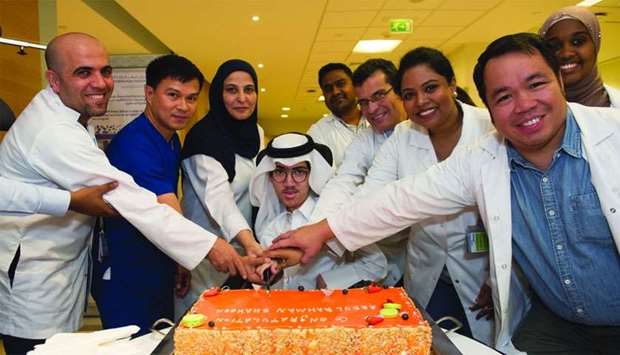Abdulrahman Shahin al-Neimi, a 16-year-old Qatari boy with spinal muscular atrophy who has benefited from the specialised care provided by Hamad Medical Corporation’s (HMC) Qatar Rehabilitation Institute (QRI), says his care team’s assistance in helping him develop his artistic abilities has been an integral part of his rehabilitation.
“I started drawing while I was recovering from surgery at a medical centre in Germany and when I returned to Qatar, the rehabilitation team at QRI encouraged me to develop my talent. My occupational therapist Anteena Aziz saw the benefits of art therapy and she also saw my passion for art. She found the assistive devices and strategies needed for me to practise my hobby and to express myself through art. Creating art has been an important outlet for me to express myself and along with physical therapy has helped me to achieve greater independence and mobility,” said Abdulrahman.

Abdulrahman Shahin al-Neimi has benefited from care provided by the QRI team.
Abdulrahman, who is currently a 10th-grade student at Khalifa Secondary School, was diagnosed with spinal muscular atrophy (SMA) when he was four-month-old. Due to a loss of nerve cells in the spinal cord and brainstem, individuals with SMA are unable to control the movement of their muscles. While there is no cure for the condition, ongoing treatment and support can help manage symptoms and help those with SMA to have the best possible quality of life.
Dr Ahmad Samer al-Qawadri, physical medicine and rehabilitation physician at QRI says his story and healthcare journey demonstrate the importance of both a positive mindset and the incorporation of alternative therapies.
“Abdulrahman has severe atrophy in his muscles and malformations in the joints of his limbs and spine. His condition is progressive, meaning it develops and grows as he ages and grows. The deformity of his spine affected his ability to sit and his balance and respiratory function. He underwent surgery in Germany to correct the spinal deformity and this was followed by a rehabilitation programme at QRI to help improve trunk control, balance, and his ability to use his hands,” said Dr al-Qawadri.
Through an intensive day rehabilitation programme at QRI, Abdulrahman’s respiratory function increased and the control of his head and spine improved. He achieved good sitting balance control and therapists at QRI began working with him to focus on improving his hand coordination, which is when his passion for art was discovered.
“Abdulrahman’s artistic talent and his passion for art were discovered while he was completing the rehabilitation programme at QRI. Our Occupational therapists noticed his talent for painting and drawing and were eager to encourage his hobby as we saw the physical and emotional benefits. His severe muscular weakness and abnormalities prevented him from fully practising his hobby so we focused on building his fine motor skills through hand therapy exercises and by providing assistive devises,” said Anteena Aziz, an occupational therapist at QRI.

